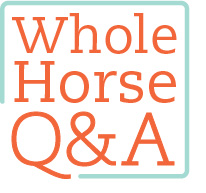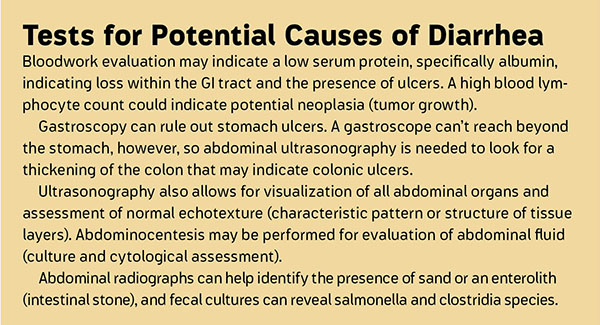Q Every 2 to 3 weeks, my 19-year-old Paint/Arabian-cross gelding develops mild diarrhea, plus he squirts liquid out of his rectum as he starts eating his breakfast. We’ve ruled out ulcers, dental problems, and parasites, plus eliminated some sand from his gut. General supplements and probiotics don’t seem to help. He’s otherwise healthy. Anything else we might try?

MICHELLE NICHOLSON, Placerville, California
A Finding the cause of intermittent diarrhea can be difficult. Sometimes there’s a medical problem, but often the condition is just a nuisance that requires management. The horse’s diet and environment may be changed, but that may not yield a permanent solution. A horse may have intermittent, noninfectious diarrhea his whole life.
Normal manure is made up of about 65-percent water, and even a modest increase to 70- or 80-percent water can produce “pipestream” diarrhea. Lush pasture can result in soft, formed manure with a watery component. The small colon has the job of final water absorption and forming of fecal balls. Sometimes, even functioning normally, it can’t absorb all the water.
To hunt down a cause of your gelding’s diarrhea, start broad. Rule out all physical-exam findings that are normal, then focus on the gastrointestinal tract. Include in the exam rectal palpation, dental exam, a fecal egg count, parasite identification, and basic bloodwork.
More advanced diagnostics to evaluate the cause of the diarrhea include gastroscopy (passing an endoscope through the horse’s nose into his stomach), abdominal ultrasonography, abdominocentesis (drawing of abdominal cavity fluid), radiography, and fecal culture for infectious agents.
Unfortunately, no single test is 100-percent diagnostic and all-inclusive, thus we have to evaluate the horse in a stepwise manner (see box).

In Northern California where you live, with its arid ecosystem, there may be many causes for intermittent diarrhea—turnout, minimal available water, your gelding’s diet, and sand or stones in the intestines (enteroliths). You mention eliminating sand, but I recommend radiographs to doublecheck, as sand or an enterolith can cause irritation and intermittent diarrhea, or lead to obstruction colic.
Even with thorough evaluation, you may never pinpoint an exact cause, and will have to manage your horse’s environment and diet as best you can. Fortunately, as frustrating as intermittent diarrhea can be for owners and vets, it isn’t usually a major problem for the horse.
ERIC SCHROEDER DVM, DACVIM
Asst. Professor, Equine Clinical Track
Dept. of Veterinary Clinical Sciences
Ohio State University






